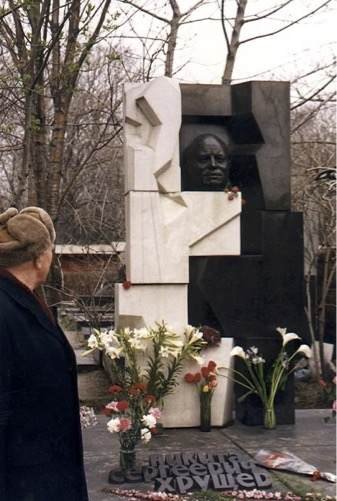Attitudes: (2) A moral and spiritual approach
Buchman believed that there is a moral and spiritual dimension to life – a ‘forgotten factor’ which is often missing in the world’s deliberations. Of course, religion can be misused – he would have acknowledged that – but he always insisted that the human being is a spiritual as well as a material and rational being.
This sculpture (left) is the gravestone of Nikita Khrushchev, the Soviet leader who succeeded Stalin in 1953. The sculptor was the artist Ernst Neizvestny.
Stalin was responsible for some terrible crimes, and Khrushchev courageously exposed this. But he did so in such a way as to promote his own power – this was an ambiguous exercise in truth-telling. The sculpture brings this out, showing how Khrushchev was a conflicted person with light and dark elements, good and bad elements competing within him for primacy.
More generally, the sculpture is a way of showing that there are moral and spiritual forces within the human being. It is a picture of all of us – for we all have good and evil within us. Sometimes the darker forces masquerade as forces of light. We have addictions, ambitions, unhealthy coping mechanisms. Buchman believed that the spiritual element needs to be awakened in people if are to tackle the needs of the world at a deep enough level. ‘The world is slow to realise that the spiritual is more powerful than the material’, he said.
This applies at the national level as well. Countries can circle around the same problems again and again without ever moving on. Deep changes are often needed if unhealthy patterns of behaviour are to be broken, and the creative potential hidden within people released. Individually and collectively, we need to develop the habit of listening to the forces of goodness.
Buchman also believed in the unity of the human being. It is a mistake to think we can compartmentalise our lives: a permitted dishonesty or corruption in some area will inevitably influence other parts of our character. Moral integrity should pervade the whole.
There was an urgency in Buchman’s thinking on these matters. He thought that the world starts to fragment and collapse when we ignore the reality of the spiritual life. An alertness to this reality is a necessity for the safety and security of nations.

